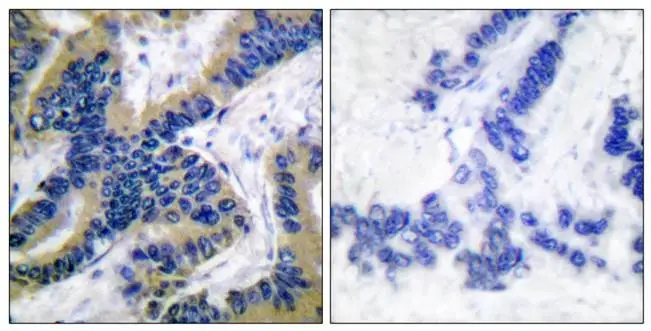![IP analysis of Jurkat cell lysate using GTX17822 Caspase 6 antibody [3F52]. IP analysis of Jurkat cell lysate using GTX17822 Caspase 6 antibody [3F52].](https://www.genetex.com/upload/website/prouct_img/normal/GTX17822/GTX17822_20191203_IP_31_w_23060620_418.webp)
IP analysis of Jurkat cell lysate using GTX17822 Caspase 6 antibody [3F52].
Caspase 6 antibody [3F52]
GTX17822
ApplicationsImmunoPrecipitation, Western Blot
Product group Antibodies
ReactivityHuman
TargetCASP6
Overview
- SupplierGeneTex
- Product NameCaspase 6 antibody [3F52]
- Delivery Days Customer9
- Application Supplier NoteWB: 1microg/ml for 2 hours at RT. IP: 2microg antibody/mg protein lysate (Use Protein G). *Optimal dilutions/concentrations should be determined by the researcher.Not tested in other applications.
- ApplicationsImmunoPrecipitation, Western Blot
- CertificationResearch Use Only
- ClonalityMonoclonal
- Clone ID3F52
- ConjugateUnconjugated
- Gene ID839
- Target nameCASP6
- Target descriptioncaspase 6
- Target synonymsCSP-6, MCH2, caspase-6, caspase-6, apoptotic protease MCH-2, caspase 6, apoptosis-related cysteine peptidase, caspase 6, apoptosis-related cysteine protease, mammalian Ced-3 homologue 2
- HostMouse
- IsotypeIgG1
- Protein IDP55212
- Protein NameCaspase-6
- Scientific DescriptionThis gene encodes a member of the cysteine-aspartic acid protease (caspase) family of enzymes. Sequential activation of caspases plays a central role in the execution-phase of cell apoptosis. Caspases exist as inactive proenzymes which undergo proteolytic processing at conserved aspartic acid residues to produce two subunits, large and small, that dimerize to form the active enzyme. This protein is processed by caspases 7, 8 and 10, and is thought to function as a downstream enzyme in the caspase activation cascade. Alternative splicing of this gene results in multiple transcript variants that encode different isoforms. [provided by RefSeq, Oct 2015]
- ReactivityHuman
- Storage Instruction-20°C or -80°C,2°C to 8°C
- UNSPSC12352203

![WB analysis of Jurkat cell lysate using GTX17822 Caspase 6 antibody [3F52]. WB analysis of Jurkat cell lysate using GTX17822 Caspase 6 antibody [3F52].](https://www.genetex.com/upload/website/prouct_img/normal/GTX17822/GTX17822_20191203_WB_56_w_23060620_868.webp)

![ICC/IF analysis of C6 cells using GTX01097 Caspase 6 antibody [GT1154]. Orange: Primary antibody Blue: DAPI](https://www.genetex.com/upload/website/prouct_img/normal/GTX01097/GTX01097_20191101_AP_002_62_w_23053121_265.webp)
![ICC/IF analysis of NIH3T3 cells using GTX01098 Caspase 6 antibody [GT1155]. Orange: Primary antibody Blue: DAPI](https://www.genetex.com/upload/website/prouct_img/normal/GTX01098/GTX01098_20191101_AP_002_64_w_23053121_112.webp)


